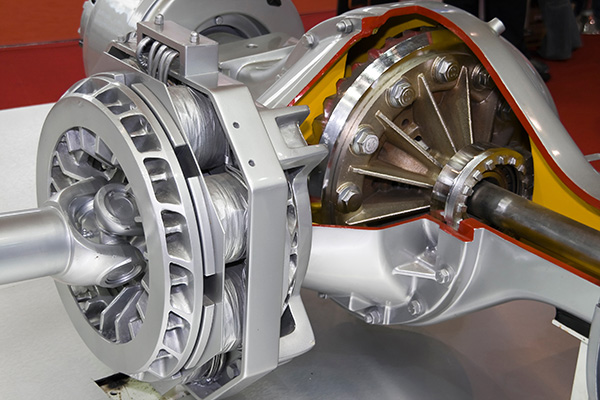
It’s not something you see when you pop the hood, and most drivers never think about it until there’s a problem—but the differential is a key part of your car’s drivetrain. It allows your wheels to spin at different speeds, especially when turning, which is essential for traction, stability, and overall drivability.
Whether you drive a front-wheel, rear-wheel, or all-wheel drive vehicle, you’ve got at least one differential working behind the scenes. So what exactly does it do—and what happens if it starts to fail?
What the Differential Actually Does
When your car goes around a corner, the outside wheels have to travel farther than the inside ones. That means they need to spin faster to keep up. The differential makes this possible by distributing engine power to the wheels while allowing them to rotate at different speeds.
Without it, both drive wheels would be locked together, which would cause tire scuffing, uneven wear, and very poor handling in turns.
In technical terms, the differential:
- Splits torque between the drive wheels
- Allows wheels to spin at different speeds while maintaining control
- Reduces stress on the drivetrain when turning or cornering
Where It’s Located
The differential’s location and design depend on how your vehicle is driven:
- Front-wheel drive vehicles have a transaxle, which combines the transmission and differential into one unit.
- Rear-wheel drive vehicles have a separate rear differential mounted between the back wheels.
- All-wheel or four-wheel drive vehicles have both front and rear differentials—and sometimes a center differential (transfer case) as well, which splits power between the front and rear axles.
Each setup requires its own maintenance strategy, and different types of differentials (open, limited-slip, locking, etc.) have their own characteristics and uses.
What Happens When the Differential Fails
Most differentials are built to last, but like any mechanical component, they can wear out—especially if they’re not properly maintained. The differential contains gears and bearings that are lubricated with a specific fluid. If that fluid breaks down or leaks out, friction and heat build up, leading to damage.
Signs of differential trouble include:
- Whining or howling noises when accelerating or turning
- Clunking sounds from the rear of the vehicle
- Excessive vibration or shuddering
- Leaking fluid near the axle seals
- Uneven tire wear
Ignoring these symptoms can lead to catastrophic failure—where the gears grind or seize completely, potentially leaving your car immobile.
Differential Maintenance Is Easier Than You Think
Differential service usually involves draining the old gear oil and replacing it with fresh fluid. Over time, the fluid becomes contaminated with metal particles and loses its ability to protect the gears. In most cases, manufacturers recommend replacing it between 30,000 to 60,000 miles—but always check your owner’s manual or consult a trusted repair shop.
In areas like Waldorf, MD, where road conditions and weather vary year-round, regular fluid changes can go a long way in extending the life of your differential.
It’s also important to have the differential inspected if you plan to tow heavy loads, drive off-road, or modify your suspension—since those conditions put extra strain on the unit.
You Shouldn’t Wait
Differential repairs can be costly if issues are left untreated. Once the internal gears are damaged, rebuilding or replacing the entire unit may be your only option. But catching the issue early—before the fluid runs dry or the gears wear out—can often save you thousands in repairs.
Plus, a properly functioning differential means a smoother, safer driving experience. It keeps your tires working together as they should and ensures the power from your engine is being used efficiently and safely.
Cottman of Waldorf – Drivetrain Experts in Waldorf, MD
If you’re hearing strange noises while turning or your vehicle just doesn’t feel right on the road, let the team at Cottman of Waldorf in Waldorf, MD inspect your differential. We’ll check the fluid, inspect for wear, and make sure your drivetrain is in top condition—so you can drive with confidence.